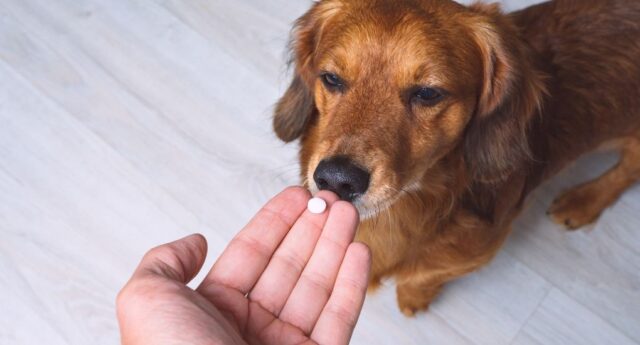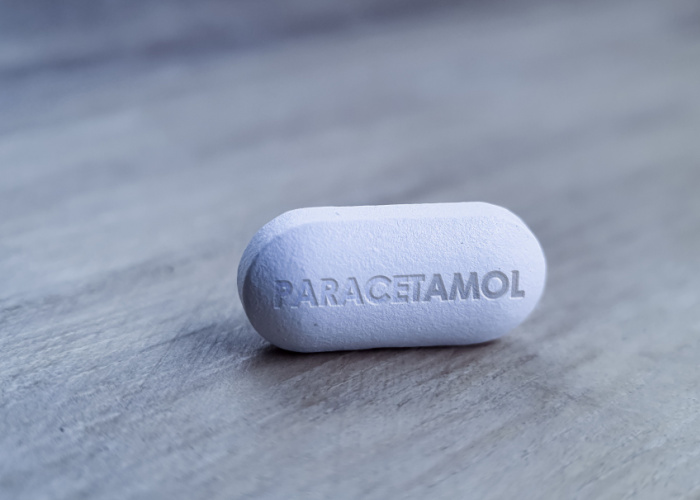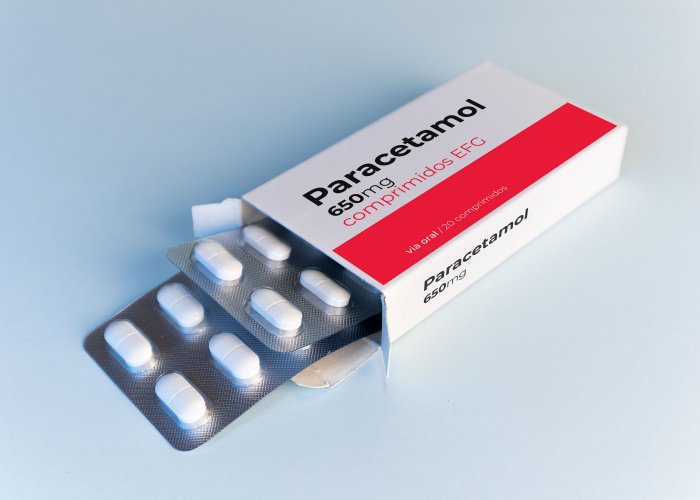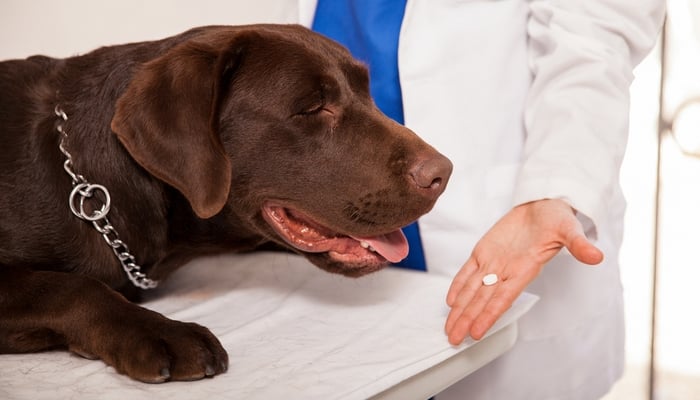
Table of Contents
- What is paracetamol?
- Why shouldn’t I give paracetamol to my dog?
- Paracetamol Poisoning in Dogs: What Happens if I Give my Dog Paracetamol?
- Symptoms of Paracetamol Poisoning in Dogs
- How much Paracetamol can a dog take?
- Treatment of Paracetamol Poisoning in Dogs
- Can dogs have ibuprofen or aspirin?
- Frequently Asked Questions
- My Dog Ate Paracetamol: Before You Go…
“Oh no! My dog ate paracetamol. Should I be worried?”
No pet owners like to see their dogs in pain.
If there's any way we can do to relieve this pain, we would've done it at once.
If you're a first-time pet owner, you might wonder if dogs can be given paracetamol, ibuprofen, and some other painkillers to relieve Fido's pain.
You might also be confused after reading your vet's prescription.
Should you buy human paracetamol? Or is there paracetamol specifically made for pets?
But giving paracetamol to dogs is not the way.
You should never give your dog paracetamol without consulting your vet first.
So, what should you do, then?
This blog will discuss everything you need to know whether or not paracetamol is safe for dogs.
But before that, let's first discuss what paracetamol is.

What is paracetamol?
Nowadays, many options exist for pain relief, stiffness, soreness, and muscle pain.
But what are the ones that are safe for dogs, and how much should you give them?
Paracetamol is a common painkiller with an active ingredient called acetaminophen.
Acetaminophen works as a pain reliever and to reduce temperature in humans. That's why when we have a fever, we usually drink paracetamol.
Even though it is safe and proven effective for people, you should never use paracetamol to treat your pet without veterinary assistance.
Paracetamol can poison and can even cause fatal results to dogs if given improperly or unsupervised.
And the best way to avoid your Fido from accidentally eating one: never let them near human medicines.
Lock it up somewhere where they can have no access. Many human medicines are very harmful to pets.
Why shouldn’t I give paracetamol to my dog?
Even though we don't want to see our dogs suffering or in pain, it's important not to rush things.
Don't give over-the-counter painkillers or any other human medications to your pet without the approval of your vet.
Paracetamol, while safe for humans, can be very dangerous for dogs, especially if given the wrong dosage.
It can result in severe liver damage, kidney failure, problems with the red blood cells, and possibly death.
Dogs' metabolism is different from us humans, and that's why medicines can react differently. Remember that our medication can contain active ingredients that can be toxic to dogs.
If you see your dog in pain, it's best to consult with your vet immediately.
They'll be able to know what's causing the pain and prescribe you the proper painkiller to help relieve your pup.
Paracetamol Poisoning in Dogs: What Happens if I Give my Dog Paracetamol?
Dogs should only be given paracetamol when a vet prescribes it.
But if your dog accidentally ate paracetamol, the severity of the side effects will depend on how much paracetamol they ate and the size of your dog.
The larger the dosage of paracetamol, the bigger the risk, especially for small-sized dogs.
A high dosage of paracetamol can lead to liver and red blood cell problems.
Again, human paracetamol is a big no-no for dogs.
However, there can be times when your vet prescribes a veterinary version of paracetamol.
When does a vet prescribe paracetamol for dogs?
Paracetamol is commonly prescribed when the dog suffers from inflammation, fever, infection, or chronic pain.
But before a vet prescribes paracetamol, many things go into consideration.
Vets must be careful and determine if paracetamol is the appropriate drug for your dog.
The vet will also consider your dog's age, weight, breed, and size. Your vet will also examine if your pet has any existing liver problems.
Vets will most likely prescribe you a dosage of 10mg per kilogram which should only be given once a day in a span of one or two days.
Always follow your vet's instructions.
If you can't remember the dosage, don't hesitate to call. It's better to be safe than sorry!
Monitor your pet for any vomiting, excessive drooling, difficulty breathing,
It’s essential that you follow your vet’s dosage and instructions very carefully while caring for your pet.
Also, monitor and report any vomiting, excessive drooling, or breathing problems.
Rush him to the vet if you see these signs.
Never be tempted to try and treat your dog by yourself. Don't administer any medication without consulting your vet first.

Symptoms of Paracetamol Poisoning in Dogs
Watch out for these signs if your dog accidentally ate paracetamol:
- Stomach pain or stomach issues
- Difficulty breathing
- Vomiting
- Excessive drooling
- Depression
- Lethargy
- Weakness
- Seizures
- Being uncoordinated
If you suspect your pup ate paracetamol and exhibits the effects above, take him to the vet immediately.
Paracetamol poisoning can be lethal if not treated quickly.
How much Paracetamol can a dog take?
Paracetamol can be toxic to dogs in high dosages.
To determine how much paracetamol a dog can take, we have to know the dog's body weight.
For instance, dogs can safely take 15mg of paracetamol per kilogram of their body weight. Higher doses will make the dog sick.
Keep in mind that a single tablet of human paracetamol has 500mg. That's why it's not safe for pet consumption.
And actually, paracetamol can also be toxic and harmful to humans if given in high doses. Paracetamol overdose can cause acute liver failure.
Dogs need to take a much smaller dose to avoid paracetamol poisoning since their body is much smaller than ours.
Any dose larger than 75mg per kilogram of body weight is considered toxic to dogs. It can cause liver and kidney damage.
A 150mg of paracetamol per kilogram of body weight can be fatal to dogs.
For example, if you own a small breed like the Pomeranian, Yorkshire Terrier, or a Shih Tzu, a single 500mg paracetamol pill can lethally poison them.
But it doesn't mean they're safe if they're bigger!
Even a 500mg pill can make large dogs very sick.
Treatment of Paracetamol Poisoning in Dogs
If you suspect or know that your dog has eaten paracetamol, consult with your vet as soon as possible, especially if Fido consumed more than 50mg per his body weight in kg.
Time is of the essence!
Paracetamol is quickly absorbed into the bloodstream.
Inducing vomit may not be effective unless the dog has literally just put the paracetamol in his mouth.
What vets may give is activated charcoal.
Activated charcoal is a fine black powder that prevents toxins from entering the bloodstream. It can be mixed with water or food and given orally at intervals.
Remember: this should only be done under the guidance of a veterinarian.
After that, your dog will be taken into monitoring and supportive care.
It usually includes intravenous drip to prevent dehydration and support their liver. It can also help eliminate the toxins out of their system.
Dogs dealing with paracetamol poisoning can also be given vitamin C to help their liver and detoxify their system.
For instance, N-acetylcysteine is great for detox after paracetamol poisoning, which can also help slow down the metabolization of toxins.
However, treatment will also depend on the severity of the poisoning.
For example, severe cases will require oxygen as part of their supportive care.
Dogs suffering from anaemia may also have a blood transfusion if they accidentally ingested paracetamol.
Can a dog survive paracetamol poisoning?
Again, no time should be wasted if you suspect your dog has eaten paracetamol.
Dogs that have been given early treatment have a higher chance of surviving.
However, they must stay in the clinic and take medication quickly to protect their liver.
Severe cases of paracetamol poisoning can lead to death.
That's why it's important to hide human medicines somewhere our dogs have no access to and consult with your vet immediately if you suspect anything strange with your dog.

Can dogs have ibuprofen or aspirin?
So now that we've finished discussing if dogs can have paracetamol, you might be wondering now if Ibuprofen or aspirin is safe for them.
Ibuprofen
Ibuprofen is highly toxic and should also never be given to dogs. It can cause severe damage to their kidneys.
Side effects can also be quick and lethal even if ingested in small amounts.
Remember that the body of a dog is very different to us humans. A lot of human medication can be toxic to pets.
Monitor your dog and contact your vet immediately if you suspect that he has eaten ibuprofen. Watch out for these signs:
- Lack of appetite
- Weakness
- Vomiting
- Black, thick stool
Aspirin
On the other hand, aspirin can be prescribed in some instances.
It's usually given in a short period of time as it can also have significant negative effects such as ulcers and gastrointestinal bleeding.
In addition, young dogs should never have aspirin because they don't have the enzyme needed to process the medicine effectively.
Always follow your vet's advice and the proper dose to avoid these harmful side effects.
Frequently Asked Questions
What do I do if my dog ate a human pill?
If your dog has eaten a human pill, it's best advised to contact your vet immediately. Watch out for any other symptoms Fido may exhibit.
Whether your dog ate pills or drank liquid medicine, it's always better to be safe than sorry during these types of situations.
How is paracetamol poisoning diagnosed?
Diagnosing acetaminophen toxicity (paracetamol poisoning) is typically confirmed by diagnostic tests, which include an acetaminophen level, electrolytes, kidney function tests, liver function tests, complete blood count, and more.
Can I give my dog human paracetamol for fever?
You should never give your dog paracetamol or any human medicine to treat pain, fever, or any other health problem unless advised by a vet.
Human paracetamol has a much higher dose which can be fatal for dogs.

My Dog Ate Paracetamol: Before You Go…
It's very tempting to give our much-loved pets painkillers, such as paracetamol, and try to treat their sickness or injury at home.
However, you should never, ever do this by yourself.
Dogs and cats process human medications differently, especially for painkillers.
Paracetamol in high doses is extremely dangerous to dogs.
It can cause liver damage that will lead to liver failure, which is a life-threatening complication.
If they have eaten paracetamol accidentally, watch for early symptoms like vomiting and unwillingness to eat, stomach pain, jaundice, excessive drooling, and more.
If you suspect your dog is in pain, consult with your vet.
Don’t try to treat them yourself or guess what might be wrong with them, as it can make your pet's situation worse or cause additional pain.
Want to learn more about dogs and meds? We have linked some related articles below that you can read next!












